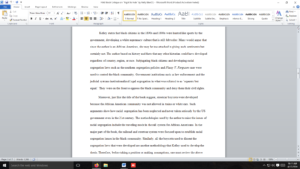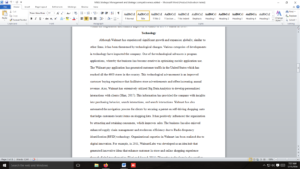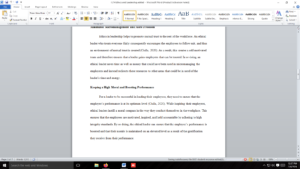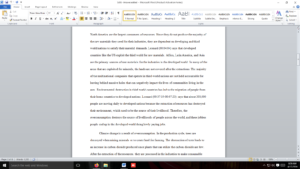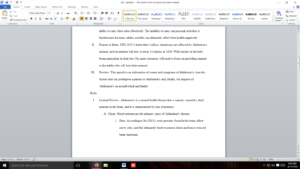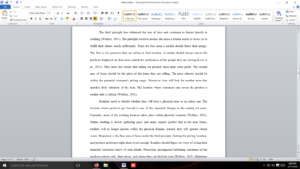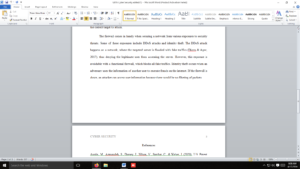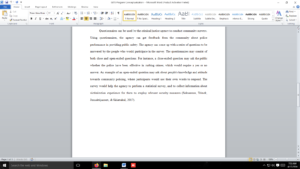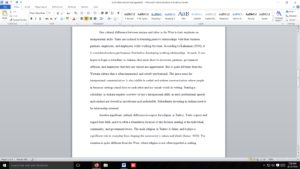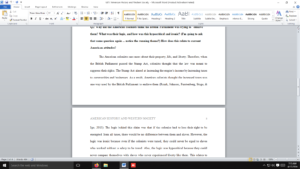While I am delighted that many of you are off to a good start on your term papers,
I am a little concerned that some of you seem to be delaying the choice of a topic.
Here are some other ideas.
Most students will (eventually) probably follow the suggested line of reasoning:
find a particular topic and/or leader as focus, and then diligently apply the relevant
concepts and theory pertaining to leadership and to ethics. This is fine – the expected
route. Many good papers should come from this approach. Yet it is not the only approach.
One might also look at a prominent and perplexing issue and examine it in light of the
relevant concepts and theories. E.g., what would leadership be like in the national opioid
crisis? Which specific institutions (public or private) might provide the leaders or leadership?
Will effective leadership in this crisis require some particular style? Or some particular
ethical approach? Does the very labeling itself (by press, government, and the AMA) of the issue
as a “crisis” change the situation regarding effective leadership? The same sort of questions might apply to a myriad of issues.
The list of relevant questions could go on and on. The list of perplexing issues to analyze is also
quite long. Such a perplexing issue may be very local as well – even in your own organization.
Use some creative thought.
Let me give you a link here from today’s WALL STREET JOURNAL – just to whet your thought!
Leadership in our IT rich age requires some behaviors and skills. While technology itself is
likely not often the critical factor, the interaction of people (individuals and teams) with technologies
can be a source of serious competitive advantage. Where and how does leadership play into this?
That is what the link is about: http://partners.wsj.com/accenture/breaking-through/
IBM, as well as many other companies, universities, and think tanks have also explored these issues in depth.
You must apply the relevant concepts and theory form the course, and these are mostly contemporary and derived from study of conventional Western institutions and people.
However, let me reiterate also the value of papers that use this material to study leadership in unconventional institutions or situations: Indian tribes, mobsters, isolated communities, proactive countertrade and the great “invisible banks” of Asia. If our cherished theory breaks down in this effort, simply note that and interpret it; that itself is a contribution. Also, of course, a focal leader for your paper need not be a “good guy.”
Finally, while you must use modern theory for analysis, you can try if you dare to apply it to historical leaders and situations. Such applications are not easy, but they are often very interesting and instructive. The possibilities are limitless. For example, as the French Revolution came to an end, a military force lead by Napoleon and his lieutenants essentially seized power, abolishing the authority of both the executive Directory and the parliamentary bodies of France in a military coup. The real genius behind the coup, however, was that old perpetual survivor, Talleyrand. Both Napoleon and Talleyrand would make good focal leaders.
For those with some interest in the way American industry and society developed, the traditionally celebrated leaders make good choices: the duPont’s, Vanderbilt, Carnegie, Rockefeller, and Ford were arguably not only the richest men of their day, but the most influential leaders. Although not extraordinarily wealthy, J. P. Morgan was perhaps the most powerful and influential leader of them all. Why are power and leadership so seldom discussed together? Why are there no women on this list? Just who were the extraordinarily influential women in that day? Yes! They were there. They were always there.
One last thought. Skepticism is often healthy. If you can’t be skeptical in grad school, when can you do it? Some have suggested that leadership cannot really be developed, that it is a romantic (but sometimes useful) idea, an attribution, or even that our understanding of leadership has NOT improved over the last three thousand years. Dig into these ideas and you will find yourself in good company – with names like Simon, Drucker, Meindl, Weick. (If you dug far enough you might even find Mankelwicz somewhere in the pack.)
Answer preview
whether to pay attention to the employees or shareholders, depending on circumstances.
Public leadership is perhaps more critical, with a conflicting view to focus on happiness or wealth creation. Posner (1979) explains that in a society where there is an emphasis on the generation of wealth over prioritizing citizens’ happiness, a more practical ethical focus is established. In this case, there is the integration of rights, happiness, and sharing with the less fortunate as a superior foundation for ethics. Some people can consider this view as ethically ridiculous, but there is a significant application, and for Richard Allen Posner, the combination is ethically attractive (Posner, 1979). During the 1980s, a period described as the resurgence of conservatism, and the ethical view was most common (Kinder, & Kalmoe, 2017). Allen Posner was an important public figure in the US as justice in the Supreme Court with key leaders in the legal issues. He was oriented to a pragmatic view rather than an ideological view, including in ethics. This research paper explains the relationship between leadership and ethics from a pragmatic view of Allan Posner. Wealth maximization, a popular leadership and ethics concept promoted by Allan Posner, is described aggressively as having ethical attractiveness.
[3246 Words]

